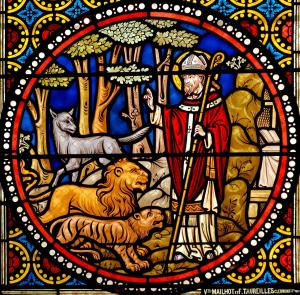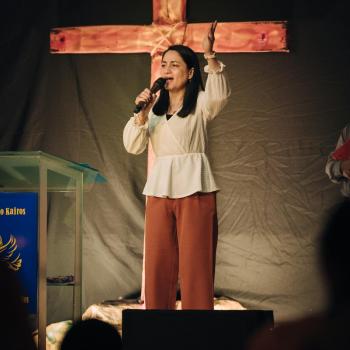
Bishops and overseers play important roles in many religious organizations, serving as leaders and administrative authorities. These titles often signify positions of significant responsibility and influence within the church, and understanding their role and their duties can provide deeper insight into the structure and governance of the church, as well as clear up many misconceptions about church leadership.
What are bishops and overseers? How did they serve the early church? What is their role today? In this post, I’ll attempt to answer these questions. Let’s start by defining a few terms.
Definitions
The Greek word episkopos (επισκοπός) has been translated in English Bibles as either “bishop” or “overseer.” Therefore, in Scripture, the words “bishop” and “overseer” can be used interchangeably.
In episkopos, the preposition epi (επι) means “on, over, upon, or at” while the noun skopos (σκοπός) means “one who watches, looks after, or guards” such as a watchman. Both Ezekiel 3:17 and Ezekiel 33:7 use the word skopos in this manner in the Septuagint.
Skopos can refer to someone placed in a high position to oversee something, such as a land, or to a messenger sent to gather information, such as a spy. Additionally, it can also refer to a “goal, target, or mark”— something one aims for or reaches towards.
Therefore, the term, episkopos, can literally mean “one who watches over,” or it can also be translated as chief “watcher, watchman, officer, guard,” etc.
Per an article on Wikipedia, “In Greek literature, the term had been used for several centuries before the advent of Christianity. It later transformed into the Latin episcopus, Old English biscop, Middle English bisshop and lastly bishop.”
Considering how the word “overseer” has been used historically and biblically to refer to slave drivers who oversee slaves, and recognizing that this seems to be what many people see as the proper relationship between church leaders and their congregations (perhaps, the idea translators were trying to convey) in the remainder of this post, I’ll mainly use the terms bishop and episkopos to refer to this position.
History
The word episkopos has a rich history of usage beyond its biblical context, with references dating back to ancient Greek literature. In Homer’s famed work, The Iliad, the term episkopoi (ἐπίσκοποι) (plural) is used to describe those with watchful oversight and guardianship.
“Thus did Athena inveigle him by her cunning, and when the two were now close to one another great Hektor was first to speak. “I will no longer flee you, son of Peleus,” said he, “as I have been doing hitherto. Three times have I fled round the mighty city of Priam, without daring to withstand you, but now, let me either slay or be slain, for I am in the mind to face you. Let us, then, give pledges to one another by our gods, who are the fittest witnesses and guardians of all covenants; let it be agreed between us that if Zeus grants me the longer stay and I take your life [psukhê], I am not to treat your dead body in any unseemly fashion, but when I have stripped you of your armor, I am to give up your body to the Achaeans. And do you likewise” (uchicago.edu).
Our focus in the Greek version of the above passage (in bold) is the following:
ἀλλʼ ἄγε δεῦρο θεοὺς ἐπιδώμεθα· τοὶ γὰρ ἄριστοι μάρτυροι ἔσσονται καὶ ἐπίσκοποι ἁρμονιάων·
According to the passage, they believed their gods were the most noble, or “best suited morally” (ἄριστοι), to be witnesses and guardians of their covenants. Thus, these gods were made as watchers and protectors. This divine connotation suggests that the concept of episkopos wasn’t solely confined to the church realm, but rather held a broader significance in Greek mythology and theology.
Additionally, the word episkopos was often used to describe government officials and their supervisory roles. In ancient Greek city-states, episkopoi were individuals tasked with overseeing various administrative and civic duties, serving as inspectors, supervisors, or commissioners. These individuals may have also been called fýlakes (φύλακες) (wikipedia) which means “guardians, watchers, keepers, or protectors.”
The episkopoi were not permanently stationed in one location but were spread across the empire, carrying out general supervisory duties with headquarters in the main imperial cities. Their responsibilities required extensive travel throughout the empire, frequently returning to Athens to provide updates to the Athenian authorities.
They functioned as chief officers and legal advisors responsible for supervising the establishment of new cities in the empire and guiding allied nations in the restructuring of their governments, often in accordance with democratic principles.
After establishing these new governments, the episkopoi conducted periodic visits to their respective territories, to verify that all allied governments were operating in alignment with Athens’ interests, the imperial hub (Balcer).
In fact, these inspection visits may be the reason why the noun episkopes is sometimes translated in English Bibles, as “visitation” in both the Old and New Testaments (Num. 7:2; Is. 10:3; Jer. 6:15; 10:15; Lk. 19:44; 1 Peter 2:12). Oddly, episkopes, not episkopos, is actually the word we see in 1 Timothy 3:1.
Nevertheless, episkopoi “were neither military commanders nor police officials but rather civilian imperial officers who exercised their influence through persuasion, the assistance of allied citizen “friends” of Athens (the Proxenoi), the articles and regulations of Athenian laws concerning the Empire, and the Athenian armed forces.” (Balcer).
According to scholars, episkopos may have been based on a Persian concept adopted by the Greeks. The Persian Empire, known for its powerful kings, relied on a network of trusted advisors, spies, and informants known as the “king’s eyes and ears” to oversee its vast territories and swiftly address any threats to the throne, ensuring the ruler’s dominance.
They were the king’s “eyes” who oversaw the rule of satraps and monitored the provinces, ensuring that no part of the Persian realm escaped his watchful scrutiny and authority. They also helped to keep the peace by ensuring fairness toward the people from those who ruled over them.
Due to their similar duties, the Greek episkopoi seem to have been equivalent to this office. This secular usage of episkopos highlights its application beyond the borders of religious institutions.
Episkopos In The Septuagint
In the Septuagint, the term episkopos is utilized to specify that Eleazar, the son of Aaron, was tasked with being in charge of the oil of the lamp, the incense, the daily meat offering, the anointing oil, the entire tabernacle and its contents, and the sanctuary and its furnishings (Num. 4:16).
In Nehemiah 11, it refers to chief officers of the provincial leaders of specific tribes in Jerusalem (vv. 9,14,22), and in Judges 9:28, the same word is translated as “deputy, officer, or governor.” The Hebrew word for “deputy” in Judges 9:28 is the noun paqid (Strong’s #6496) which is from the verb paqad (Strong’s #6485), meaning “to attend to, visit, avenge, inspect, or review.”
In 2 Kings 11:15, the word is often translated as “commanders” or “officers” of the host, or army. The word translated as “host” or “army” is dunameos (δυνάμεως), which literally means, might, power, authority, or influence. Young’s literal translation renders it as, “inspectors of the force.”
Thus, in the Septuagint, episkopoi referred to officers or captains who led a people or a task, ensuring things were done correctly and in order. This would have been accomplished through visits, inspections, and reviews.
Gradually, the term was adapted to a more specialized ecclesiastical context, where it would become profoundly important to church governance and leadership.
New Testament Usage
A bishop, one of the actual “offices” mentioned in the Bible, is either an appointment by God, or by people. It just depends on the context.
The New Testament reveals a clear pattern regarding the role and function of bishops in the early Christian church. These individuals were positioned as key figures and supervisors over the congregation, or certain tasks.
We see in Acts 20:28, where elders were tasked with “shepherding” or caring for the church of God. They were to be on their guard (v. 31) to keep watch over themselves and all the flock of which the Holy Spirit had made them bishops.
In 1 Peter 5:2-3, elders were also called to tend to the flock. Specifically, they were to do this by “exercising oversight” or watching over the people; not grudgingly but willingly, not in a domineering manner, but by themselves being examples.
Among many other roles—apostle, missionary, evangelists, teacher—it should be no surprise to see that Paul himself was a bishop, but in a more general rather than localized sense, similar to a Greek episkopos.
“Some of you have become arrogant, as if I were not coming to you. But I will come to you very soon, if the Lord is willing, and then I will find out not only how these arrogant people are talking, but what power they have. For the kingdom of God is not a matter of talk but of power. What do you prefer? Shall I come to you with a rod of discipline, or shall I come in love and with a gentle spirit?” (1 Cor. 4:18-21)
“Although I hope to come to you soon, I am writing you these instructions so that, if I am delayed, you will know how people ought to conduct themselves in God’s household, which is the church of the living God, the pillar and foundation of the truth.” (1 Tim. 3:14-15)
Something to bear in mind, is that in the Bible, or in any other text, a person doesn’t have to be explicitly labeled as something in order for them to be that thing. It’s us who place so much emphasis on giving titles. Actions can speak volumes, and clearly, the Apostle Paul fulfilled the duties of an episkopos.
He may have also trained and guided more bishops, including possibly Timothy, whom he “loved,” suggesting that he approved of him and chose him as a disciple, or apprentice. It’s similar to how God revealed Jesus as his chosen and beloved Son (Matt. 3:17), and how Christ showed contentment with the Rich Young Ruler, inviting him to become his disciple (Mark 10:21).
“I am writing this not to shame you but to warn you as my dear children. Even if you had ten thousand guardians in Christ, you do not have many fathers, for in Christ Jesus I became your father through the gospel. Therefore I urge you to imitate me. For this reason I have sent to you Timothy, my son whom I love, who is faithful in the Lord. He will remind you of my way of life in Christ Jesus, which agrees with what I teach everywhere in every church.” (1 Cor. 4:14-17)
Paul wasn’t just a guardian or bishop—he was like a father. He established churches, and helped them to get up and running. Afterwards, much like the Athenian episkopos, he visited them to ensure they were following God’s will.
He didn’t just explain Bible passages, as we tend to do when we set out to “teach,” but instead taught a way of life, as a bishop should. He inspected, investigated, and issued corrective measures as necessary.
“It is actually reported that there is sexual immorality among you, and of a kind that even pagans do not tolerate: A man is sleeping with his father’s wife. And you are proud! Shouldn’t you rather have gone into mourning and have put out of your fellowship the man who has been doing this? For my part, even though I am not physically present, I am with you in spirit. As one who is present with you in this way, I have already passed judgment in the name of our Lord Jesus on the one who has been doing this.” (1 Cor. 5:1-3)
“But now I am writing to you that you must not associate with anyone who claims to be a brother or sister but is sexually immoral or greedy, an idolater or slanderer, a drunkard or swindler. Do not even eat with such people.” (1 Cor. 5:11)
Paul’s letters to the Philippians, Timothy, and Titus provide further insight into the structure, qualifications, and responsibilities of bishops. In Philippians 1:1, he addresses his letter to the “overseers and deacons” in the city of Philippi, indicating that there were multiple bishops serving the local assembly. The same would have been true at Ephesus (Acts 20:17-31).
The letters to Timothy (1 Tim. 3:1-7) and Titus (Titus 1:5-9) likely outline the specific requirements for bishops, who were responsible for the community’s well-being. These requirements include trustworthiness and integrity since a bishop, also known as a watchman, must be reliable and honest, avoiding corruption or selfish motives, as the community relies on them for safety.
To fulfill their role successfully, episkopoi must demonstrate self-control and a sound mind to effectively make critical decisions and judgments that impact the congregation’s security and health. Thus, they had to be of good character in order to have authority from the Spirit and respect from the people, to be an example the church would wish to follow.
Essentially, an episkopos refers to someone who “watches over,” “guards,” or “protects.” It’s someone who observes, keeps, reinforces, or “looks after” usually in regards to laws, covenants, or material possessions.
Episkopos In Early Christianity
It wasn’t until the emergence of early Christianity in the 2nd century that the term episkopos became more closely associated with the church setting. The early church adopted this word to describe the office and function of one who was entrusted with the oversight of local congregations. Per Britannica:
“A 2nd-century bishop was charged with the spiritual welfare of his congregation; he was the chief liturgical minister, and he baptized, celebrated the Eucharist, ordained, absolved, controlled finances, and settled matters of dispute. With state recognition of Christianity in the 4th century, the bishop came to be regarded not only as a church leader but also as an important figure in secular affairs.
As the bishops’ duties increased and congregations grew in size and number, it became necessary either to have more bishops or to delegate some of their functions to others. Congregations in an area (diocese) were entrusted to presbyters (priests), assisted by deacons, under the supervision of a bishop. It was this system of church government that became established throughout the church. The bishop retained as his exclusive right the power to confirm church members, ordain priests, and consecrate other bishops.
As the Middle Ages advanced, the system of delegation of duties became excessively organized, and an ecclesiastical bureaucracy came into being. A complex hierarchy of subordinate officials acted on the bishop’s behalf.” (Britannica)
A church bishop today will obviously not mirror one from biblical times. But, if they did, perhaps there wouldn’t be such a divergence among believers with varying doctrines and denominations.
Back then, a bishop played an essential role in shaping behavior and making crucial judgments among church members who were living in community with one another. With time, the focus has shifted, and the role of a bishop, or episkopos, has adapted to the modern church and its culture.
Although the role of a bishop varies according to denominations and congregations, common duties include: communicating with church elders, overseeing music and fellowship ministries, handling church finances, teaching and preaching, and providing the church with an overall direction. But, again, bishops don’t all perform the same functions, and when they do, they don’t all do them the same way.
Nevertheless, at a minimum, a bishop within a congregation should be tasked with safeguarding the members from harmful teachings, false doctrines, and individuals who intend to cause division or chaos. In other words, don’t allow any and everyone to get up and say any and everything during your weekly meetings, including the “head pastor” if they aren’t sound in their doctrine and laboring in the study of the Word.
Conclusion
If I could simplify it as much as possible, an episkopos is one who makes sure things go the way they are supposed to go, and they do this through close examination, observation, and investigation. Their job is to direct, inspect, and correct.
In ancient Greece, these episkopoi or “overseers” usually traveled to different provinces in order to establish and inspect them, according to the will of the governing authorities. They also discouraged rebellion, and made sure the people weren’t being taken advantage of by those placed over them.
In order to do this, these individuals had authority to instruct the leaders of those areas in the correct way of doing things, and to suggest corrective measures if needed.
In the church, an episkopos held a similar role, exercising oversight over the congregation, by watching, guarding, directing, and encouraging. No matter how large or small their jurisdiction, an episkopos, overseer, or bishop—all referring to the same role in the New Testament—served as a watchman or guardian of God’s covenant.
To reiterate, a bishop cares for the flock not through pastoral means, but through oversight, ensuring covenant adherence as per the King’s standards. While the shepherd attends to the flock’s needs, the episkopoi are watchmen, or guardians, who keep out predators, namely false teachers, and harmful doctrines, by rooting and grounding the church in the truth.
A church pastor, then, is to a shepherd as episkopoi or watchmen are to LGDs. An LGD, or livestock guardian dog, tends to the flock but not in the way as a shepherd. These dogs are raised with the flock and work to keep out wolves and other predators. They protect and guard the sheep and keep things that are harmful out.
Within the church, episkopoi fulfill this role by guiding congregations in the paths of God and reinforcing his commandments, necessitating the ability to teach or instruct (1 Tim. 3:2). Teaching the way of God, fosters a solid foundation, eliminating ignorance that could allow false teachings and harmful doctrines to infiltrate the church, and lead people astray towards other gods and unrighteousness.
This, however, cannot be done through human power to command, but through the power of influence (Eph. 4:7-16) which is the power and authority granted by God—a much greater and more beneficial authority than what many in the church are seeking today. What do I mean by this?
In the world, individuals grant authority to others, enabling them to oversee and command the completion of specific duties. Yet, within the Kingdom, God empowers individuals with influential capabilities that play a role in shaping the character and conduct of the rest of the community.
Many of those in the church seem to want the power of the world, bestowed by men, to govern the church, rather than the power of God, given by the Holy Spirit. But, only the latter advances God’s kingdom, since giving commands does not change hearts.
In the Lord’s assembly, episkopoi were expected to serve others and to lead by example, using this God-given influence, entrusted to them through the Holy Spirit. This is evident throughout Scripture (Num. 11:25; Acts 6:3; Acts 20:28;1 Peter 5:3; 1 Tim. 4:12).
By observing, inspecting, and giving wise and godly instructions, they ensured those within his kingdom were aligned with his ways and his principles. It was the ultimate duty of biblical episkopoi to do this, and it should be the primary function of bishops today.
Works Cited
Balcer, J. M. (1977). The Athenian Episkopos and the Achaemenid “King’s Eye.” The American Journal of Philology, 98(3), 252–253.
Britannica, T. Editors of Encyclopaedia (2019, June 23). episcopacy. Encyclopedia Britannica. https://www.britannica.com/topic/episcopacy














